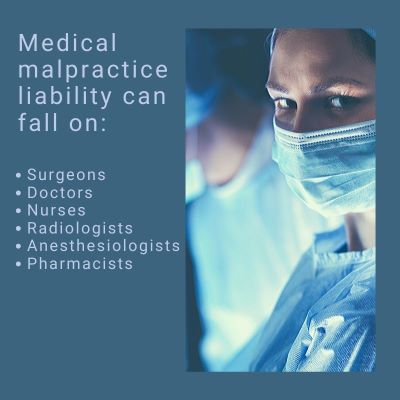Posted: October 23, 2019
 Liability in a medical malpractice case can vary based upon the circumstances of the injury and the employment status of the person who caused it. Surgeons, nurses, anesthesiologists, attending physicians, and hospitals may all bear some responsibility.
Liability in a medical malpractice case can vary based upon the circumstances of the injury and the employment status of the person who caused it. Surgeons, nurses, anesthesiologists, attending physicians, and hospitals may all bear some responsibility.
Medical malpractice is the third-leading cause of death in the United States. It is particularly insidious because of the trust we place in our health-care providers to maintain a high standard of care. At Shapiro & Sternlieb, LLC, our experienced medical malpractice attorneys can help you pursue justice and recover the compensation you deserve. Read on to learn about what it takes to hold various parties liable for malpractice.
Which Individuals Can Be Liable for Medical Malpractice?
Medical malpractice occurs when a medical professional fails to care for a patient with a reasonable amount of expertise and judgment. Every case is different, but depending on the specifics of your claim, the responsible party may be:
- Doctors: A doctor who fails to diagnose your illness, prescribes the wrong medication, or otherwise fails to provide adequate care can be held liable for the injuries they caused.
- Surgeons: Surgeons who carelessly leave surgical equipment inside your body, operate on the wrong body part, or fail to anticipate potential complications can be liable for your injuries.
- Nurses: Nurses who fail to follow doctors' instructions or accurately monitor their patients can be held liable.
- Radiologists: A radiologist can be held liable for misinterpreting the results of X-rays, MRIs, or other diagnostic exams.
- Anesthesiologists: Administering too much anesthesia can potentially be fatal. Administering too little can cause a patient great suffering. Anesthesiologists who fail to give proper doses may be held liable.
- Pharmacists: A pharmacist who provides the wrong dosage or fills a prescription with the wrong medication can be held liable.
Can I Sue a Hospital For Medical Malpractice?
In many cases, a hospital can be held liable for the actions of its employees through the legal principle of vicarious liability. Also known as "respondeat superior," Latin for "let the master answer," vicarious liability holds the employer responsible for the negligence of the employee if the negligence occurred within the scope of employment.
To determine whether an action occurred within the scope of employment, courts generally use these standards:
- The negligence occurred while the employee was on the clock,
- The negligence occurred during an activity the employee was hired to perform, and
- The employer benefitted from that activity.
Because treating patients, diagnosing illnesses, performing surgeries, and many other actions fall within a medical professional's scope of employment, hospitals can often be held liable for negligence that occurs during those activities.
However, medical professionals are not always considered employees of the hospital in which they work. Many are independent contractors who work in multiple hospitals. In these scenarios, you would not be able to hold a hospital liable for the actions of an independent contractor.
To establish whether a medical professional is an employee of a hospital or not, courts will examine these factors:
- Whether the hospital determines the doctor's or surgeon's fees
- Whether the hospital has significant control over the medical professional's compensation
- Whether the hospital controls the professional's working hours
- Whether the hospital exercises substantial control over the professional's job conditions
Hospitals can also be sued for malpractice on their own without going through the principle of vicarious liability. A hospital can be held liable for things such as:
- Negligent hiring: Hospitals have a duty to hire qualified medical professionals who can adequately perform their duties. Hospitals are responsible for carefully reviewing the backgrounds and credentials of potential employees and investigating any complaints previously made against them.
- Continued employment of an incompetent health care provider: If a medical professional has demonstrated that they can't perform their duties, the hospital has a responsibility to terminate their employment.
- Understaffing: Hospitals must have adequate levels of staff on hand to provide proper care to their patients. In understaffed hospitals, patients suffer.
Contact Our New Jersey Medical Malpractice Attorneys Today
At Shapiro & Sternlieb, LLC, our dedicated medical malpractice attorneys have nearly 60 years of combined legal experience. If you or a loved one has been injured because of medical malpractice, we will fight tirelessly to bring you justice and recover the compensation you deserve.
We serve Englishtown, Newark, Jersey City, Monmouth and Middlesex Counties, and nearby areas of New Jersey. Call (732) 617-8050 today to schedule a consultation.



